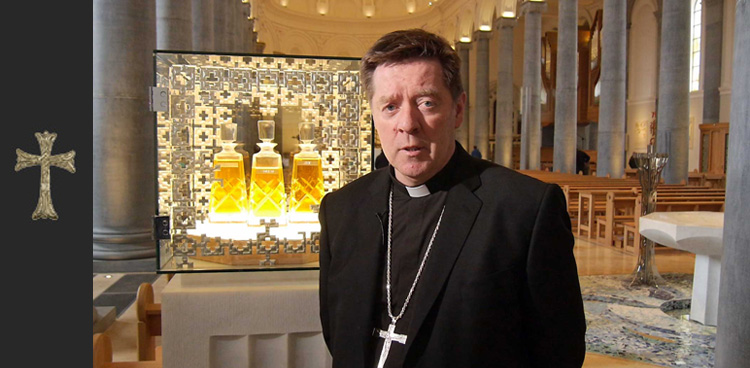Bishop Francis Duffy has published a pastoral letter concerning the reality of sustaining the faith community in the Diocese of Ardagh and Clonmacnois. The pastoral letter Sustaining our Faith Community in the Diocese of Ardagh and Clonmacnois was read at Masses in all 41 parishes in the diocese last weekend. Bishop Duffy has asked parishioners to think actively about how to cope with the reality of the reduction in the number of priests.
At present, the Diocese of Ardagh and Clonmacnois has 53 diocesan priests serving 41 parishes, but many of these priests are reaching the end of their ministry. Bishop Duffy predicts that by 2030 the diocese will have only 25 diocesan priests, less than half the number it has at present.
Bishop Duffy said, “Over the next 13 years, 28 of our 53 diocesan priests will reach the retirement age of 75 years. By the time children baptised this year reach Confirmation our diocese will be a very different place.
“These statistics tell us that from this year on, as our priests retire or are transferred, there will not be priests to replace them and so an increasing number of parishes will not have resident clergy. In the very near future your parish may not have a resident priest, or if you have, then your priest may be called on to provide pastoral care in a neighbouring parish that it without a resident priest.”
Bishop Duffy goes on to highlight the many positive parish initiatives involving greater involvement of lay people in the life of the Church such as Ministers of the Word, Extraordinary Ministers of Holy Communion, members of Parish Pastoral Councils, Parish Finance Committees, Ushers, Altar Servers, Safeguarding, Eucharistic Adoration groups, sacramental preparation teams, in addition to the long established choirs and the committees and individuals who maintain churches in such good order.
Bishop Duffy also highlighted some of the diocesan initiatives involving lay people such as the Diocesan Pastoral Council, a Diocesan Liturgy Commission, Finance Committee, Accord, Safeguarding Committee, Diocesan Advisors in Catechetics and the Saint John Paul II Awards for young people. He also highlited the two most recent initiatives in the diocese, the introduction of the Parish Catechist and the Permanent Diaconate.
Bishop Duffy offered his blessing and heartfelt gratitude to all involved in these ministries and initiatives.
Bishop Duffy went on to paint a picture of what the decline in clergy numbers will mean. He said, “In the midst of all these developments there has been a steady decline in the number of our priests. Many of you will fondly remember when there were two or three priests working in your parish and where now there is only one. Three of our parishes do not have a resident priest.
“This trend of a declining number of clergy is set to continue. At the moment we have 52 very dedicated diocesan priests in our parishes but sadly no seminarians preparing for ordination. In addition we have four priests from abroad and from missionary congregations who are working in the diocese. This means we have a declining, and an ageing, group of clergy.
“From both a pastoral and a duty of care perspective, it is important that the responsibilities our clergy now carry are shared with parishioners even more so than at present.”
He said, “This ongoing development will impact every parish in the diocese and will bring about considerable change in how the parishes are organised and also in the way the Good News of Jesus Christ is passed on to succeeding generations. Critically, there will also be an impact on the workload of priests and their welfare is our concern in this changing context.”
Bishop Duffy wants parishioners to start actively thinking about how parishes will cope with a reduced number of priests, in particular how parishes provide faith formation to free up priests for sacramental duties.
Bishop Duffy said, “The Catechism of the Catholic Church states ‘the Sunday celebration of the Lord’s Day and his Eucharist is at the heart of the Church’s life.’ The Sunday Eucharist and the celebration of the sacraments and the pastoral care of people are of central importance for every parish. As a consequence, consideration needs to be given to developing and enabling parish faith development and pastoral care to continue and to flourish with fewer priests and with greater involvement of parishioners.
“All our parishes are divided into Pastoral Areas. One Pastoral Area in the southern part of the diocese has already rationalised the number of Masses in the context of a declining number of clergy. This is not about closing churches but about reimagining how we worship and pass on our Christian faith.
“At this time you and our priests have a unique and precious opportunity to serve the Lord by encouraging and engaging with each other to prepare for and take on responsibility for the formation, promotion and practice of the faith at local level in changing circumstances. We continue to pray for and promote vocations to priesthood and religious life. A time of decline in one area can be an opportunity for growth in other areas.”
Concluding his pastoral letter Bishop Duffy said, “I invite your support as we prepare for a future that will differ greatly from the past in terms of how we worship as a faith community. I therefore ask each of you to consider carefully these matters and I would greatly welcome your input and suggestions directly, or through your Parish Pastoral Councils, as we seek to meet this challenge together under the guidance of the Holy Spirit.”
You can read the full text of Bishop Duffy’s pastoral letter on catholicbishops.ie.
ENDS


